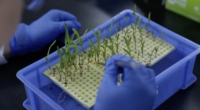The Pandemic Sciences Institute (PSI) at the University of Oxford and the Defence Science and Technology Laboratory (Dstl) have joined forces to tackle deadly pathogens. The two organisations will work together to study dangerous pathogens that could cause future pandemics, such as the Nipah virus. This virus can spread between animals and humans, primarily in parts of Asia, with a high mortality rate and no approved vaccines or treatments. The collaboration will provide PSI with access to Dstl’s high containment laboratories to enable them to work with high-threat viruses included in the UK Government priority pathogen list. Dstl, on the other hand, will benefit from access to external expertise, with the potential for staff secondments and joint mentoring. Other areas of collaboration may include research into the development of medical countermeasures for known and unknown high priority threats and their broader pathogen families, collaboration on non-high containment pathogens, and joint applications for funding programmes. This partnership will help the UK and the world to be better prepared for potential future pandemics and combat deadly pathogens effectively.
New Partnership to Combat Deadly Pathogens
The University of Oxford’s Pandemic Sciences Institute (PSI) and the Defence Science and Technology Laboratory (Dstl) have teamed up to tackle deadly pathogens. These dangerous pathogens pose a significant threat to global health and security, whether occurring naturally or being used as weapons. The requirement for national highly secure containment laboratories has never been greater, and these high containment facilities are pivotal to UK security and resilience, although expensive to maintain.
The University of Oxford has established PSI to better equip the world to prepare for, identify, and counter future pandemic threats, including pathogens that require high containment facilities for their research. Meanwhile, Dstl has high containment capabilities and extensive experience in handling high-consequence pathogens. Therefore, the partnership between the two scientific organizations will enable them to study the deadly pathogens that could cause future pandemics more effectively.
The recent successful collaboration between Dstl and PSI on the development of a lateral flow device for mpox (monkeypox) indicates the effectiveness of joint research and the application of Dstl’s prior research investment to an immediate public health need. The agreement will give PSI access to Dstl’s high containment laboratories to work with high-threat viruses included in the UK Government priority pathogen list. In return, Dstl will benefit from access to external expertise, with the potential for staff secondments and joint mentoring.
The initial focus of the partnership will be on the Nipah virus, which can spread between animals (bats and pigs) and humans. The virus is most prevalent in parts of Asia, primarily Bangladesh and India, with a high mortality rate and currently no approved vaccines or treatments. PSI and Dstl may jointly fund a four-year PhD programme to better understand how the virus infects its host, with the goal of developing new antiviral treatments.
Other areas of collaboration may include research into the development of medical countermeasures for known and unknown high priority threats and their broader pathogen families, collaboration on non-high containment pathogens, and joint applications for funding programmes. This partnership will help the UK and the world to be better prepared for potential future pandemics and combat deadly pathogens effectively.
New Partnership to Combat Pathogens
The Defence Science and Technology Laboratory’s Head of Chemical, Biological and Radiological Division, Simon Earwicker, stated that the UK has a significant pool of expertise in hazardous pathogen research. Working jointly with the Pandemic Sciences Institute will enable them to maximise the impact of this capability and develop a future stream of qualified personnel. Professor Sir Peter Horby, Director of the Pandemic Sciences Institute, said that this new partnership would accelerate vital research on dangerous emerging pathogens, such as Nipah virus. They cause death and disease in many parts of the world and threaten global health security. By working together, with access to high containment labs and sharing skills and expertise between their organisations, they will help ensure the world is better prepared to counter future pandemic threats.
Don’t miss interesting posts on Famousbio









